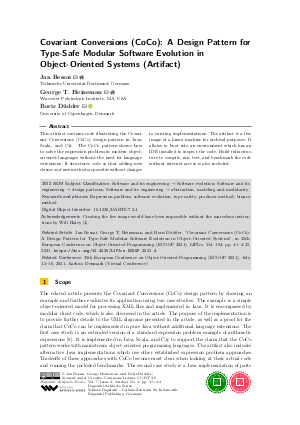@Article{bessai_et_al:DARTS.7.2.4,
author = {Bessai, Jan and Heineman, George T. and D\"{u}dder, Boris},
title = {{Covariant Conversions (CoCo): A Design Pattern for Type-Safe Modular Software Evolution in Object-Oriented Systems (Artifact)}},
pages = {4:1--4:4},
journal = {Dagstuhl Artifacts Series},
ISSN = {2509-8195},
year = {2021},
volume = {7},
number = {2},
editor = {Bessai, Jan and Heineman, George T. and D\"{u}dder, Boris},
publisher = {Schloss Dagstuhl -- Leibniz-Zentrum f{\"u}r Informatik},
address = {Dagstuhl, Germany},
URL = {https://drops-dev.dagstuhl.de/entities/document/10.4230/DARTS.7.2.4},
URN = {urn:nbn:de:0030-drops-140287},
doi = {10.4230/DARTS.7.2.4},
annote = {Keywords: Expression problem, software evolution, type safety, producer method, binary method}
}

 Creative Commons Attribution 4.0 International license
Creative Commons Attribution 4.0 International license
